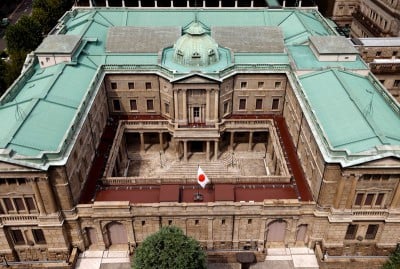 © Reuters. FILE PHOTO: Japanese national flag is hoisted atop the headquarters of Bank of Japan in Tokyo, Japan September 20, 2023. REUTERS/Issei Kato JP225 +0.60% Add to/Remove from Watchlist Add to Watchlist Add Position
© Reuters. FILE PHOTO: Japanese national flag is hoisted atop the headquarters of Bank of Japan in Tokyo, Japan September 20, 2023. REUTERS/Issei Kato JP225 +0.60% Add to/Remove from Watchlist Add to Watchlist Add Position Position added successfully to:
+ Add another position Close
By Leika Kihara and Tetsushi Kajimoto
TOKYO (Reuters) -The Bank of Japan further loosened its grip on long-term interest rates by tweaking its bond yield control policy again on Tuesday, taking another small step towards dismantling the controversial monetary stimulus of the past decade.
The bank's nine-member board also revised up its price forecasts to project inflation well exceeding its 2% target this year and next, underscoring a growing conviction that conditions for phasing out ultra-loose monetary policy are falling into place.
But the yen tumbled against the dollar after the decision as traders focused on the BOJ's dovish pledge to "patiently" maintain accommodative policy and forecast for inflation to slow back below 2% in 2025.
"We still haven't seen enough evidence to feel confident that trend inflation will (sustainably hit 2%)," BOJ Governor Kazuo Ueda said at a press briefing after the decision. "As such, we don't see a big risk of being behind the curve."
As widely expected, the BOJ maintained its -0.1% target for short-term interest rates and that for the 10-year government bond yield around 0% set under its yield curve control (YCC).
But the BOJ re-defined 1.0% as a loose "upper bound" rather than a rigid cap and removed a pledge to defend the level with offers to buy unlimited amount of bonds.
"Given extremely high uncertainties over the economy and markets, it's appropriate to increase flexibility in the conduct of yield curve control," the BOJ said in a statement announcing the decision.
BALANCING ACT
The decision highlights how rising global bond yields and persistent inflation are making it increasingly difficult for the BOJ to maintain its controversial bond yield control.
In public, Ueda has continued the dovish rhetoric of his predecessor Haruhiko Kuroda who retired in April this year, arguing massive monetary stimulus is still needed to revive sluggish consumer demand.
However, the weak yen and other factors have prompted the BOJ to very gradually water down some of the stimulus of the Kuroda era, including YCC.
"(The) BOJ will buy some bonds around that (1%) level but not unlimited and they’ve shown their hand. Through all the linguistic contortions, the fact is that they are dismantling YCC," said Tom Nash, portfolio manager at UBS Asset Management in Sydney, who is positioned for a rise in Japanese yields.
"A yield cap isn't a yield cap if you change it every time the market gets close."
Under criticism that its heavy defence of the cap is causing market distortions and an unwelcome currency fall, the BOJ raised its de-facto ceiling for the yield to 1.0% from 0.5% in July.
Since then, rising global bond yields have put the BOJ in a tight spot with the 10-year JGB yield rising to a fresh decade high of 0.955% hours before Tuesday's decision.
While the tweak could reduce the need for the BOJ to ramp up bond buying, it may cement market expectations of a near-term end to YCC and negative interest rates.
PRICE PRESSURES
Inflation stayed above the BOJ's 2% target for the 18th straight month in September, and surveys have shown heightening inflation expectations, which lower the real cost of borrowing.
But the BOJ has remained a dovish outlier among global central banks that have mostly hiked rates aggressively in recent years to combat rampant inflation, haunted by a legacy of premature tightening that had drawn criticism from politicians for delaying an exit from chronic deflation.
Despite repeated assurances by Ueda that ultra-low interest rates will stay, markets are already predicting a policy shift early next year.
Nearly two-thirds of economists polled by Reuters expect the BOJ to end negative rates next year.